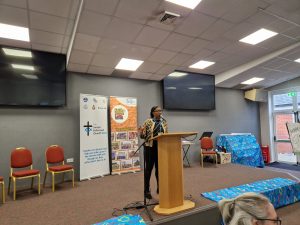“This is the reason we exist, God’s mission to the world,” began the Revd Dr John Bradbury, General Secretary, in the opening worship of the first day of the Conversations at the Crossroads conference.
John was reflecting on Jeremiah 29: 4-7, as the text that underlines much of the thinking and praying of the Church Life Review. In particular, he drew the 100-strong gathering of URC mission and discipleship “animators” to the words from this Old Testament passage, “build houses and live in them, plant gardens, eat what they produce … seek the welfare of the city where I have sent you for in its welfare you will find your welfare”.
In his opening address, John spoke of the natural church inclination to hold back the tide of change in an attempt to take things back to where they were. Instead, he urged the denomination not to resist change but to remain faithful, recognising that God has brought us to the place where we are.
He closed by saying that the conference represented a strand of the Church Life Review which would address how the denomination engages with being apostles and evangelists, how we plant gardens for the future, some of which may grow and some which may not.
Karen Campbell, Global and Intercultural Secretary, welcomed everybody and offered a “getting to know” you exercise.

This was followed by the Revd Dr Robert Pope, Director of Studies in Church History and Doctrine at Westminster College and convenor of the URC’s Worship, Faith and Order Committee. Recognising the rich array of gifts and graces in the room, Robert quipped that he felt like the “lion in a den of Daniels”.
He reflected on the Book of Deuteronomy where the Hebrews are standing in between the times of exile and the hope of the promised land. Moses encouraged them to remember the past, keep the Covenant and to choose between life and death. Recalling the shared history unites people in the present. In his first Bible study of the conference, he asked people to consider two questions: What from our past should go with us and what should we celebrate?
Nigel Pimlott then led the first of the interactive sessions. The group was asked to consider what kind of crossroads people felt the denomination is facing. A common theme amongst the table discussions was one of seeking consensus amongst our diverse contexts. Should we be more collective or congregational in our outlook? Held in tension was a mixture of the hope the crossroads represents and the fear of the changes it might bring.
Myles Dunnett in his capacity, as Church Life Review Programme Manager, in the last formal session of the day, painted the picture of the latest developments in the Church Life Review. The hope is to establish and resource the foundation from which new Christian communities can grow.
Learn more about the Church Life Review.

